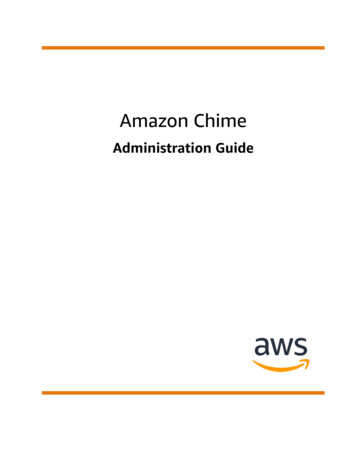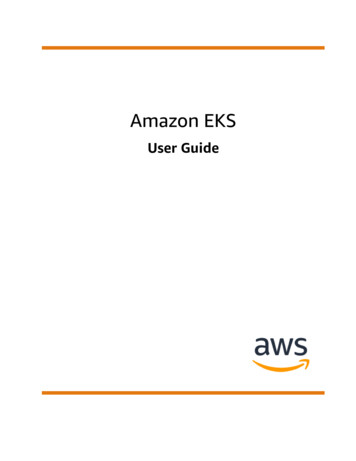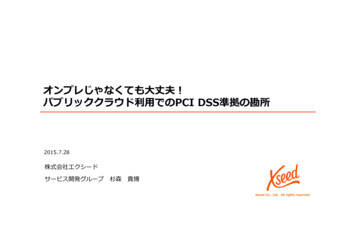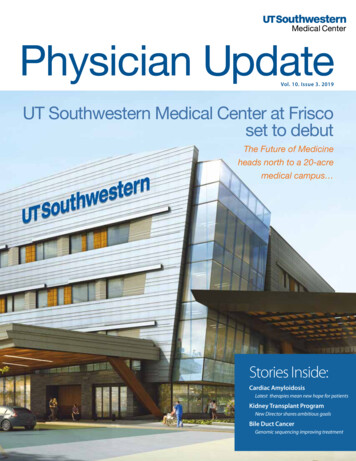
Transcription
Physician UpdateVol. 10. Issue 3. 2019UT Southwestern Medical Center at Friscoset to debutThe Future of Medicineheads north to a 20-acremedical campus Stories Inside:Cardiac AmyloidosisLatest therapies mean new hope for patientsKidney Transplant ProgramNew Director shares ambitious goalsBile Duct CancerGenomic sequencing improving treatment
CardiologyUT Southwestern FriscoAt a GlanceFriscoConvenient support servicesAlong with exceptional care, UT SouthwesternMedical Center at Frisco will house imaging andlab services as well as a retail pharmacy to conveniently and efficiently meet patient halmologynOrthopedics & Sports MedicinenOtolaryngology (including advancedhearing testing and singing-voice care)nn2Plastic SurgeryP H YS I CI A NOutpatient care in more than a dozenspecialtiesnOn-site lab, imaging, and retailpharmacynExpedited appointmentsnContinuing Medical EducationopportunitiesnAccess to clinical trialsnAdjacent to Texas Health HospitalFriscoutswmed.org/friscoThe UT Southwestern/Texas Health campus in Frisco features UTSW’s outpatient center (middle),THR’s hospital (right), and a parking garage (left).nComprehensive Spine CarenSurgery (general, bariatric, colorectal,vascular, and endocrine/thyroid)nUrologyPediatric SpecialtiesPhysical Medicine & RehabilitationnFor information or to make a referral,call 469-604-9000.UT Southwestern specialties in FriscoAdult Specialties105 exam ynUrologyHIGHWAY 380HIGHWAY 75When it opens in December, UT SouthwesternMedical Center at Frisco will offer referring physicians and their patients in Collin County access tomore than a dozen specialties in both adult andpediatric care. The facility, situated 25 miles northof UT Southwestern’s main campus in Dallas, willbe the latest milestone in the Medical Center’sexpansion in the Metroplex, joining UTSW clinicalfacilities in Richardson/Plano, Park Cities, LasColinas, and Fort Worth that have opened inrecent years.The new four-story, 120,000-square-footfacility in Frisco will be part of a modern, 20-acremedical campus located on the Dallas North Tollway just north of Eldorado Parkway, developedby UT Southwestern and its partner, Texas HealthResources.UT Southwestern Medical Center at Friscowill provide outpatient specialty care, while TexasHealth will offer inpatient care and surgical services next door at the new Texas Health HospitalFrisco, connected to the Medical Center by acovered pedestrian bridge.4 stories, 120,000 square feetnDALLAS NORTH TOLLWAYAfter more than twoyears of construction,Frisco’s newest medicalfacility is ready for itsgrand opening.n1Y 12HWAHIGFor decades, there were no FDA-approved treatments for transthyretin cardiac amyloidosis (orATTR) in the U.S. But in the past two years, newtherapies have been approved for the disease,and UT Southwestern is creating a comprehensive program to care for patients with thecondition.The developments mean new hope forpatients in North Texas battling what had beenthought to be a hopeless disease. (Median survival of ATTR without proper treatment is justtwo to five years.)Amyloidosis is characterized by proteinsthat “misfold,” explains Justin Grodin, M.D., acardiologist in UT Southwestern’s Clinical Heartand Vascular Center. “Imagine the proteins as 3Dorigami figures with perfectly folded edges,” hesays. “In patients with amyloidosis, the folds areimperfect, and the protein can’t hold its structure. The protein breaks down into a substancecalled amyloid, which can travel through thebody and deposit in the organs like excessivemortar in a brick wall.”Amyloid deposits cause heart muscle tissueto stiffen, preventing the heart from contracting and relaxing normally during heartbeats.Cardiac amyloidosis requires prompt, effectivetreatment.“Recently approved drugs are helpingpatients and providers shift their thinking aboutcardiac ATTR,” Dr. Grodin says. “Now, we see itas a condition that can be managed, givingpatients better outcomes and improving theirquality of life.”One drug, tafamidis, has been shown toslow the progression of cardiac ATTR, Dr. Grodinnotes. Tafamidis acts like a bit of glue to holdprotein folds in place, stabilizing them so theydon’t misfold. While tafamidis doesn’t cure orreverse cardiac ATTR, the drug has been shownto reduce the risk of death by 30% and thefrequency of cardiac-related hospitalization,according to data published in the New EnglandJournal of Medicine.Vague symptomsDiagnosing cardiac amyloidosis takes some detective work because of the vagueness of symptoms, which can include, among other things,shortness of breath, chest pain, and bloating.Too often, Dr. Grodin says, ATTR is recognized after it has progressed to a point where outcomesare likely to be poor. Sometimes symptoms aredismissed as normal signs of aging. “There canbe substantial delays in establishing the diagnosis. The median time from symptom onsetto diagnosing cardiac amyloidosis might rangefrom two to three years,” Dr. Grodin notes.The condition can be diagnosed using aspecialized heart scan, echocardiogram, orcardiac MRI. However, sometimes a heart biopsyis required if other tests yield ambiguous results.“A distinct specialty program – like ours atUT Southwestern – is needed to accurately diagnose amyloidosis and align available treatmentoptions,” Dr. Grodin says. UT Southwestern offersa comprehensive, patient-centered approach todiagnosis and treatment involving specialists incardiology, neurology, hematology, and pathology, among other disciplines.Patient support is an important element ofamyloidosis care as well, he adds. UT Southwestern is involved with amyloid support groupsand the Amyloidosis Foundation. Additionally,UTSW will be participating in several clinicaltrials in the next few years to study the effectiveness of other drugs for ATTR.“We are well-equipped to address thisdifficult disease,” Dr. Grodin says, adding thatUTSW receives a large number of referrals foramyloidosis.To schedule a referral with Dr. Grodin,call 214-645-8300.UT Southwestern Medical Center at Frisco12500 N. Dallas ParkwayFrisco, Texas 75033For a list of UTSW providers on-site,visit utswmed.org/frisco-providers.U P DAT ENew drugs, new program, new hope for devastatingcardiac conditionJustin Grodin, M.D.P H YS I C I A NU P DAT E3
NeurosurgeryUT Southwestern Neurosurgeryopens North Dallas clinicUT Southwestern’s neurosurgical expertise isnow available on the Texas Health Dallas campus on Walnut Hill Lane in North Dallas.UT Southwestern Neurosurgery at TexasHealth Dallas features UT Southwestern facultyphysicians providing both outpatient and inpatient neurosurgical care.Outpatient consultations are performed inProfessional Office Building 3, while inpatientconsultations and surgical procedures are performed at Texas Health Presbyterian Hospital,located next door.“Our physicians provide the full spectrum ofadult neurosurgical care, including spine, brain,and peripheral nerve surgery,” says Chris Taylor,M.D., Professor of Neurosurgery and MedicalDirector of Neurosurgery at Texas Health Dallas.“Most surgeries are performed at Texas HealthPresbyterian Hospital. If a patient needs uniquesubspecialty care or complex multidisciplinarycare, or if they desire treatment at UT Southwestern’s William P. Clements Jr. UniversityHospital, the UT Southwestern Neurosurgeryoffice at Texas Health Dallas will facilitate theconnection.”Did You Know?UT Southwestern neurosurgeons performabout 2,000 complex surgeries each year.UTSW has been recognized by Healthgradeswith a 2019 Cranial NeurosurgeryExcellence Award.Skilled in diagnosis and treatmentUT Southwestern’s neurology and neurosurgeryprogram is nationally ranked by U.S. News &World Report as among the top programs in thenation for 2019-20.“Our neurological surgeons are highlyskilled in diagnosing and treating both commonand complex neurosurgical problems,” notes Dr.Taylor. “One aspect of our program that sets usapart and helps ensure success for our patientsand their referring physicians is the truly built-inelement of collaboration between our neurosur-4P H YS I CI A NU P DAT Egeons and the program’s nonsurgical specialistsin neurology, neuro-oncology, interventionalradiology, pathology, neurocritical care, andphysical medicine and rehabilitation.“By combining the talents of our surgeonswith our nonsurgical specialists and researchers, we’re offering access to the latest, mostinnovative treatments in one of the most rapidlyadvancing fields of medicine.”Conditions treatedSurgeons at the new UT SouthwesternNeurosurgery at Texas Health Dallas clinic arefellowship trained in their chosen area of subspecialization and together provide care for thefull range of spine, brain, and peripheral nerveconditions, including:Spinen Neck and back painn Disc herniationn Sciatican Spinal stenosisn Spondylolisthesisn Spinal deformityn Scoliosisn Spine fractureBrainMetastatic tumorn Primary tumorn Meningioman Pituitary adenoman Acoustic neuroman Aneurysmn Arteriovenous malformationn Chiari malformationn Hydrocephalusn Trigeminal neuralgiaUT Southwestern Neurosurgeryat Texas Health Dallas ProvidersKathryn (Kat) Hoes, M.D.Spine Disease, GeneralNeurosurgeryUT Southwestern Neurosurgery at Texas Health Dallas islocated at 8230 Walnut Hill Lane, Professional Building 3,Suite 514.Meet Dr. David WojciechowskiMedical Director, Kidney Transplant ProgramDavid Wojciechowski, D.O.Education & TrainingAnthony (Tony)Maioriello, M.D.Cerebrovascular Disease,General NeurosurgeryMedical School: Philadelphia College ofOsteopathic MedicineResidency: Internal Medicine, WashingtonHospital Center/Georgetown UniversityHospitalFellowships: Nephrology, MedStarGeorgetown University Hospital; TransplantNephrology, University of California,San FranciscoRussell Payne, M.D.Peripheral Nerve Disease,General NeurosurgeryChris Taylor, M.D.General NeurosurgeryTerrill (Andy) Vaughan,M.P.A.S., PA-CGeneral NeurosurgerynPeripheral Nerven Carpal tunnel syndromen Ulnar neuropathyn Nerve entrapmentTransplantDavid Wojciechowski, D.O., was recently namedMedical Director of UT Southwestern’s KidneyTransplant Program, joining the UTSW facultyfrom Massachusetts General Hospital, where hewas Director of Transplant Nephrology ClinicalResearch.His research focuses on kidney transplantation, specifically on preventing and treatingpost-transplant viral infections, increasing accessto transplantation, and evaluating immunosuppression protocols to maximize patient outcomesand minimize toxicity.Why did you decide to specialize in transplantnephrology?Referrals made easyUT Southwestern Neurosurgery at TexasHealth Dallas welcomes referrals andoffers four convenient ways to get themdone smoothly:1. Fax demographics, clinical information,and imaging reports to 214-645-02322. Call our Neurosurgery New PatientReferral Team at 214-645-2300(choose option 2)I started my medical career with internalmedicine training. Later, during my nephrologyfellowship, it was the interaction with transplant patients that first turned my attentiontoward thinking about transplant as a career. Inmedicine, we’re often presented with a problemfor which we might not have a great solution.But in the area of kidney failure, by offeringtransplant we’re offering hope for patients andgiving them a second chance in life. That’s rarein medicine and a wonderful opportunity tohelp people.3. Call our Neurosurgery Nurse Hotlineat 214-648-0360What prompted you to come toUT Southwestern?4. Email demographics, clinical information, and imaging reports to THDNeurosurgery@utsouthwestern.eduOur program here is experiencing tremendousgrowth, and that’s very exciting. Our maingoal is to make transplant available to as manypatients as quickly as possible. We’re looking toexpand our living-donor kidney transplant program and also patient access to cutting-edgeclinical trials. Clements University Hospital wasalso attractive because of its transplant-friendlyfeatures, such as a specialized transplant ICUand the capability for in-room dialysis.What does it take to make a successfultransplant?Certainly it takes work on the part of thetransplant team. Transplant is not an isolatedfield – it takes good surgeons, good transplantnephrologists, pharmacists, social workers,financial counselors, etc. Fortunately, we haveall those things at UT Southwestern. But there isanother component as well: patient participation. Transplant patients have to be engaged intheir health care – staying on top of taking theirmedications, having their labs checked on aregular schedule, and so on. Of course, we helpthem with all that; patient education is a veryimportant component of our program.What do you tell transplant patients who fearthey are going to have to live in a bubble therest of their life?just have to be smart and do common-sensethings. That is, I think, the take-home message.Sure, patients are more susceptible to unusualinfections after transplant, especially immediately afterward. But we’re able to give themmedications to help prevent those from happening. Over the long term, transplant patientsreally are at risk for the same things as you and I.Where is the Kidney Transplant Program’sfocus now?We have a lot of very ambitious goals. First, wewant to enhance our infrastructure so that wecan further increase capacity. Second, we wantto look at how we can increase utilization inthe deceased-donor pool. And finally, we wantto engage our community – go out and meetproviders, nurses, and other team members. Letthem know we’re here to support them, to provide them with world-class transplant care, andto ensure they know we want to be a partnerwith them going forward.To make a referral to the Kidney Transplant Program, call877-392-1528. Calls answered 24/7 by a registered nurse.All transplant surgeries at UT Southwestern takeplace at William P. Clements Jr. University Hospital.The hospital houses dedicated areas for abdominal(kidney and liver) and thoracic (heart and lung)transplant care.I tell them the whole point of the transplant is toget them to live longer and have a great qualityof life. Get out and live – go to a movie, takeyour wife out to dinner, go to Disneyland. YouP H YS I C I A NU P DAT E5
OncologyOrthopaedicsPutting the spotlight on a rare diseaseUTSW program focuses on reducing geriatricfractures, improving patient mobility“It’s really a watershedmoment for this malignancythat few really studied inthe past.”Shaalan Beg, M.D.Director, Geriatric Fractures ProgramShaalan Beg, D.O.Parsia Vagefi, M.D.Bile duct cancer is relatively rare – only about8,000 cases are diagnosed in the U.S. eachyear – but interest in the disease is growing,and UT Southwestern is among those activelyinvestigating and testing new treatments forit, says Shaalan Beg, M.D., a medical oncologist at UTSW who specializes in gastrointestinalcancers.“It’s really a watershed moment for this malignancy that few really studied in the past,” hesays. “It was sort of an orphan disease, and nowthere’s a lot of interest in it.”The reason bile duct cancer is now poppingup on radars? For one thing, the disease appearsto be rich in specific genomic mutations thatmight have targeted drugs linked to them,offering opportunities for treatment that arenot available for other types of gastrointestinalcancers.“GI cancers such as pancreatic cancer tendnot to have a lot of these mutations that we candevelop targeted medicines against,” says Dr.Beg, who co-leads the Gastrointestinal CancersDisease-Oriented Team at UT Southwestern’sHarold C. Simmons Comprehensive Cancer Center. “But from studies coming out, it seems thatbile duct cancers might be an exception. In fact,there are many of these different mutations, andthey are found at a much higher rate than inother GI cancers.”Genomic sequencing and clinical trials6P H YS I CI A NU P DAT EAccording to Dr. Beg, that’s something teammembers at Simmons Cancer Center identifiedearly on, leading them to do genomic sequencing on all UTSW bile duct cancer patients so thatphysicians can decide if the individual patientsare candidates for these targeted treatments.“We have trials targeting these specificmutations, and if we don’t have a trial, we’ll sendthe patient to one of our collaborators,” Dr. Begnotes. “But it all starts with genomic sequencing. All bile duct cancer patients should have itdone, and they do here.”As a high-volume bile duct cancer center,UT Southwestern offers a robust program ofclinical trials for the disease, Dr. Beg notes. “Wehave trials to test new drugs and to validate thatpreviously identified medications are effective.We are very active in this area,” he says.bile duct, followed by liver transplant. “We’vegot the expertise across multiple disciplines– medical oncology, radiation oncology, hepatology, advanced endoscopy, and transplantsurgery – that allows us to offer this complexbut lifesaving therapy to patients. It’s just oneway that we’re pushing boundaries at UTSW,”says Parsia Vagefi, M.D., Chief of the Division ofSurgical Transplantation.For Drs. Beg and Vagefi, being at theforefront of bile duct cancer investigation andtreatment is exciting – and apparently they’renot alone in that feeling. Research on bileduct cancer is currently taking place in manyuniversity hospitals, medical centers, and otherinstitutions around the world, according to theAmerican Cancer Society.You can count UT Southwestern amongthose interested in – and capable of – confronting this heretofore lonely disease.Fragility fractures rank high on the list of worrisome health considerations for seniors, theircaregivers, and their physicians. Arm, hip, orspine fractures caused by falls or traumaticinjuries affect more than 2 million people in theU.S. every year.For decades, however, fragility fracture treatment has been severely siloed across healthcare organizations. After surgical repair of thefracture, hospital discharge has too often beenthe end of a patient’s care. The patient wouldbe sent to rehabilitation with no preventivemeasures in place.Because the U.S. population is trendingolder, a national movement is underway for thedevelopment of bone fragility programs that incorporate prevention for seniors. In North Texas,such a program exists only at UT Southwestern.“It’s an important emphasis because 10,000people are turning 65 years old every day – the‘silver tsunami’ is real,” says Megan Sorich, D.O.,Director of the UT Southwestern Geriatric Fractures Program. “The prevalence and incidenceof fragility fractures increase with age, and thenumber of seniors is only going to rise, so thesole focus of our program is on how to take better care of them.”An expert in geriatric orthopaedic trauma aswell as shoulder and elbow surgery, Dr. Sorichreceived advanced training in fragility fracturesunder the direction of Julie Switzer, M.D., at theUniversity of Minnesota, which has the onlyLiver transplantationAlong with genomic testing and multiple clinical trials, Dr. Beg points to another factor positioning UTSW well in the treatment of bile ductcancer: a highly experienced liver transplantprogram that has a cutting-edge transplantprotocol for patients with bile duct cancer.The protocol calls for chemotherapy followed by radiation treatment targeted to theTo schedule a referral to Dr. Beg or Dr. Vagefi, call214-645-8300.“10,000 people are turning65 years old every day – the‘silver tsunami’ is real.”Megan Sorich, D.O.Director, Geriatric Fractures Programfellowship in geriatric orthopaedic trauma inthe country.Dr. Sorich came to UT Southwestern specifically to lead the Geriatric Fractures Program.She is assisted by Varatharaj Mounasamy, M.D.,who was recruited from Virginia CommonwealthUniversity, where he studied under Stephen L.Kates, M.D., a past president of the InternationalGeriatric Fracture Society and one of the trueleaders in the field. Dr. Mounasamy served as Director of the Orthopaedic Trauma Fellowship atVCU and previously received advanced trainingin adult reconstructive orthopaedics through afellowship at the University of Virginia MedicalCenter.“Multidisciplinary management is integralto the program and part of what sets it apart,”says Dr. Sorich, Assistant Professor of Orthopaedic Surgery. “Our team includes orthopaedicsurgeons, the hospitalist team, and specialists ingeriatric medicine, physical therapy, nutrition,social work, and bone mineral metabolism.Working together with a patient-centered focus,we hope to improve inpatient care and preventthe next fracture from occurring.”The UTSW Geriatric Fractures care team focuseson two distinct, patient-focused goals:1. Help patients regain prior functional status.“When a patient enters our program, we striveto fix or stabilize the fracture surgically within24 hours,” says Dr. Mounasamy, Professor ofOrthopaedic Surgery. “The goal is to get thepatient up and walking the same day wheneverpossible, even patients who undergo full andpartial joint replacements or transsacral-transiliac screw stabilization.”Dr. Mounasamy adds, “Every day a patientspends in bed reduces strength and increasesthe risk of bed sores and infections. Thesedeficits contribute to morbidity and mentalhealth concerns related to decreased mobilityand quality of life. Expedited physical and occupational rehabilitation mitigates deficits andincreases the chance of full recovery.”2. Prevent future fragility fractures.UT Southwestern’s Endocrinology Departmentspearheads the prevention component of theGeriatric Fractures Program. This team helpspinpoint and medically manage the underlyingcauses of a patient’s bone fragility.“Our high-risk osteoporosis clinic providesbone-density testing, as well as laboratory testing of a patient’s vitamin D, calcium, and varioushormone levels to guide proper treatment withmedication to improve bone health,” Dr. Sorichsays.Research has shown that providing medication therapy in conjunction with expeditiousphysical rehabilitation after surgery can reducefragility fracture recurrence, she notes. Afterthe first fracture, a patient is at greater risk foranother without systemic treatment.Preventing that next fracture from ever happening is the whole goal of UT Southwestern’sprogram, Dr. Sorich adds: “With this protocol,we can reduce the risk of recurrent fracturesand potentially prolong high-quality years of apatient’s life.”To refer a patient to the Geriatric Fractures Program atUT Southwestern, call 214-645-8300.Megan Sorich, D.O., and Varatharaj Mounasamy, M.D.P H YS I C I A NU P DAT E7
NON PROFITUS POSTAGEPAIDTWMS5323 Harry Hines BoulevardDallas, Texas 75390-8546UT Southwestern is an Affirmative Action/EqualOpportunity Employer. Women, minorities,veterans, and individuals with disabilities areencouraged to apply.Cancer, braintowers to elevatecare, researchUT Southwestern has broken ground on twonew buildings to accommodate growth in theareas of cancer patient care and brain research.The Outpatient Cancer Care Tower of theHarold C. Simmons Comprehensive CancerCenter and the Research Tower of the PeterO’Donnell Jr. Brain Institute are expected toopen in the fall of 2022.The two nine-story buildings – eachapproximately 300,000 square feet – will belocated on UTSW’s North Campus along HarryHines Boulevard.According to Simmons Cancer Center Director Carlos Arteaga, M.D., the new Cancer CareTower will triple current cancer care capabilitieson campus, adding space for private treatmentrooms, genetic counseling, imaging, physicalmedicine, clinical trials, supportive care, andtelemedicine.Meanwhile, the brain-related ResearchTower will help UT Southwestern attract thebest research talent, top-flight faculty, and mostoutstanding Ph.D. students in the country, saysJoseph Takahashi, Ph.D., Chair of Neuroscience.Patient andPhysicianReferral Servicesp. 214.645.8300817.882.2700f. 214.645.7999It’s a three-peat: UTSW againearns Best Hospital rankingFor a third consecutive year, UT SouthwesternMedical Center is the No. 1 hospital in DallasFort Worth and No. 2 in Texas, according to U.S.News & World Report’s annual Best Hospitalslistings.In addition, UT Southwestern received national rankings in seven specialties, placing eachwithin the top 50 out of 4,500 medical centersUSNWR evaluated for 2019-2020. Nationallyranked specialties are:nNeurology & NeurosurgerynGeriatricsnNephrologynDiabetes & EndocrinologynUrologynCardiology & Heart SurgerynEar, Nose & ThroatUSNWR also gave UT Southwestern HighPerforming ratings in five additional specialties – cancer; gastroenterology and GI surgery;ophthalmology; orthopedics; and pulmonologyand lung surgery – as well as for procedures forabdominal aortic aneurysm repair, aortic valvesurgery, heart failure, colon cancer surgery, lungcancer surgery, and chronic obstructive pulmonary disease.UT Southwestern physicians offer consultations and treatment in approximately 80 specialties. Recognizing that navigatingthrough the many programs and resources at UT Southwestern can be challenging, the University established Patient andPhysician Referral Services to assist external physicians and their staff with securing patient appointments. Offices may callone centralized phone number to schedule a consultation in any clinic or to fax patient records related to a referral.The UT Southwestern referral coordinator will work closely with the appropriate physician or clinic to coordinate the patient’sappointment, as well as contact the patient and referring physician’s office with the appointment details. 2019 UT Southwestern Medical Center. MKT 22088 11
UT Southwestern Neurosurgery at Texas Health Dallas is located at 8230 Walnut Hill Lane, Professional Building 3, Suite 514. UT Southwestern's neurosurgical expertise is now available on the Texas Health Dallas cam-pus on Walnut Hill Lane in North Dallas. UT Southwestern Neurosurgery at Texas Health Dallas features UT Southwestern faculty
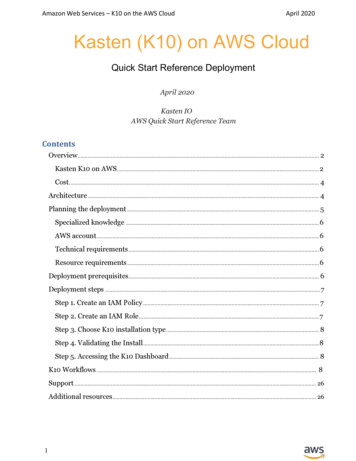
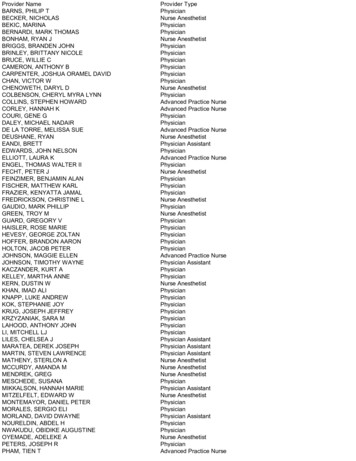
![Index [beckassets.blob.core.windows ]](/img/66/30639857-1119689333-14.jpg)

